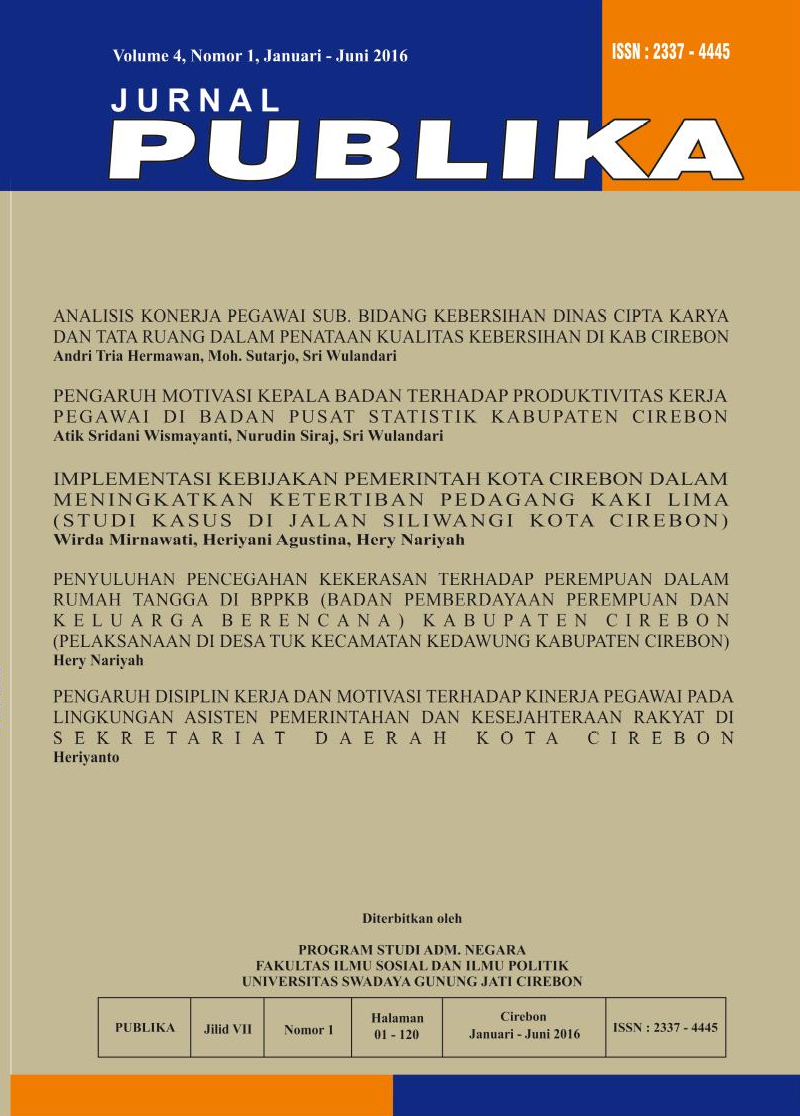PENYULUHAN PENCEGAHAN KEKERASAN TERHADAP PEREMPUAN DALAM RUMAH TANGGA DI BPPKB (BADAN PEMBERDAYAAN PEREMPUAN DAN KELUARGA BERENCANA) KABUPATEN CIREBON (PELAKSANAAN DI DESA TUK KECAMATAN KEDAWUNG KABUPATEN CIREBON)
DOI:
https://doi.org/10.33603/publika.v4i1.1507Abstract
ABSTRACT
Â
Violence against women today is an interesting matter because it is widely discussed by practitioners, non-governmental organizations (NGOs), academics and the wider community. This was motivated by the demands of a more complex role of women in line with the times that tend to pay more attention to Human Rights (HAM) without looking at or differentiating gender.
Activities carried out by the author use qualitative methods with descriptive analysis studies because the writer wants to describe and explain an event or situation. As described by Rachmat (1994: 24), that descriptive research only describes situations or events, does not test hypotheses.
Domestic violence (domestic violence) is a problem that often occurs in households. Therefore, prevention must be done early. Religious education and the practice of religious teachings in the household are the keys to success in preventing domestic violence.
To prevent domestic violence in the household, love, and compassion must be developed early on. Mother can play a big role in teaching children at home to love and love each other. Because the main perpetrators of domestic violence are generally husbands, the role of religious leaders, educators, sociologists, and intellectuals must be at the forefront to continue to voice the importance of the household as the smallest unit in society to be built well and away from domestic violence. In order to communicate this to the wider community, the role and participation of the media are very important and decisive.
Practice a saying "My house is my palace". However the situation is a house, the house must be a place that gives warmth, calmness, peace, protection, and happiness to all family members.
References
DAFTAR PUSTAKA
, 2000. Prinsip-prinsip Pengawasan. Jakarta: Pustaka Setia.
Manulang, M, 2001. Dasar-dasar Manajemen. Yogyakarta: Gadjah Mada University Press.
, 1995. Dasar-dasar Manajemen. Jakarta: Ghalia Indonesia.
Moleong, Lexy, J, 2010. Metodologi Penelitian Kualitatif. PT. Remaja Rosdakarya.
, 1999. Administrasi Pembangunan. PT. Bumi Aksara.
Abrar Ana Nadhya, Tamtari Wini (Ed) (2001). Konstruksi Seksualitas Antara Hak dan Kekuasaan. Yogyakarta: UGM.
Athoillah, Follet, 2010. Dasar-dasar Manajemen. Bandung: CV. Puataka Setia.
Handayaningrat, Soewarno, 1980. Pengantar Studi Ilmu Administrasi Negara dan Manajemen. Jakarta: NV. Sapdodadi.
Dep. Kes. RI. (2003). Profil Kesehatan Reproduksi Indonesia 2003. Jakarta: Dep. Kes. RI
Hasbianto, Elli N. (1996). Kekerasan Dalam Rumah Tangga. Potret Muram Kehidupan Perempuan Dalam Perkawinan, Makalah Disajikan pada Seminar Nasional Perlindungan Perempuan dari pelecehan dan Kekerasan seksual. UGM Yogyakarta, 6 November.
Komnas Perempuan (2002). Peta Kekerasan Pengalaman Perempuan Indonesia. Jakarta: Ameepro.
Monemi Kajsa Asling et.al. (2003). Violence Againts Women Increases The Risk Of Infant and Child Mortality: a case-referent Study in Niceragua. TheInternational Journal of Public Health, 81, (1), 10-18.
Neunatal. Alat untuk Memantapkan Hukum, Kebijakan, dan Standar Pelayanan. Jakarta: Dep. Kes. RI.
Prayudi, 1981. Hukum Administrasi Negara. Jakarta: Ghalia Indonesia Press.
Sarwoto, 2001. Dasar-dasar Organisasi dan Manajemen. Bandung: Alumni.
Rahman, Anita. (2006). Pemberdayaan PerempuanDikaitkan Dengan 12 Area of
Concerns (Issue Beijing, 1995). Tidak diterbitkan, Universitas Indonesia, Jakarta, Indonesia.
Sciortino, Rosalia dan Ine Smyth. (1997). Harmoni: Pengingkaran Kekerasan Domestik di Jawa. Jurnal Perempuan, Edisi: 3, Mei-Juni.
Siagian, Sondang, P, 2003. Filsafat Administrasi Negara. PT. Bumi Aksara.
Sugiyono, 2008. Metode Penelitian Administrasi. Bandung: Alfabeta.
Terry, 2009. Prinsip-prinsip Manajemen. Jakarta: PT. Bumi Aksara.
Wardhana, Wisnu. 1995. Dampak Pencemaran Lingkungan. Yogyakarta: Andi.
Downloads
Published
Issue
Section
Citation Check
License
The Authors submitting a manuscript do so on the understanding that if accepted for publication, copyright of the article shall be assigned to Jurnal Ilmiah Publika Prodi Administrasi Publik. Universitas Swadaya Gunung Jati as publisher of the journal. Copyright encompasses rights to reproduce and deliver the article in all form and media, including reprints, photographs, microfilms, and any other similar reproductions, as well as translations.
Jurnal Ilmiah Publika, Universitas Swadaya Gunung Jati and the Editors make every effort to ensure that no wrong or misleading data, opinions or statements be published in the journal. In any way, the contents of the articles and advertisements published in Jurnal Ilmiah Publika are the sole responsibility of their respective authors and advertisers.


